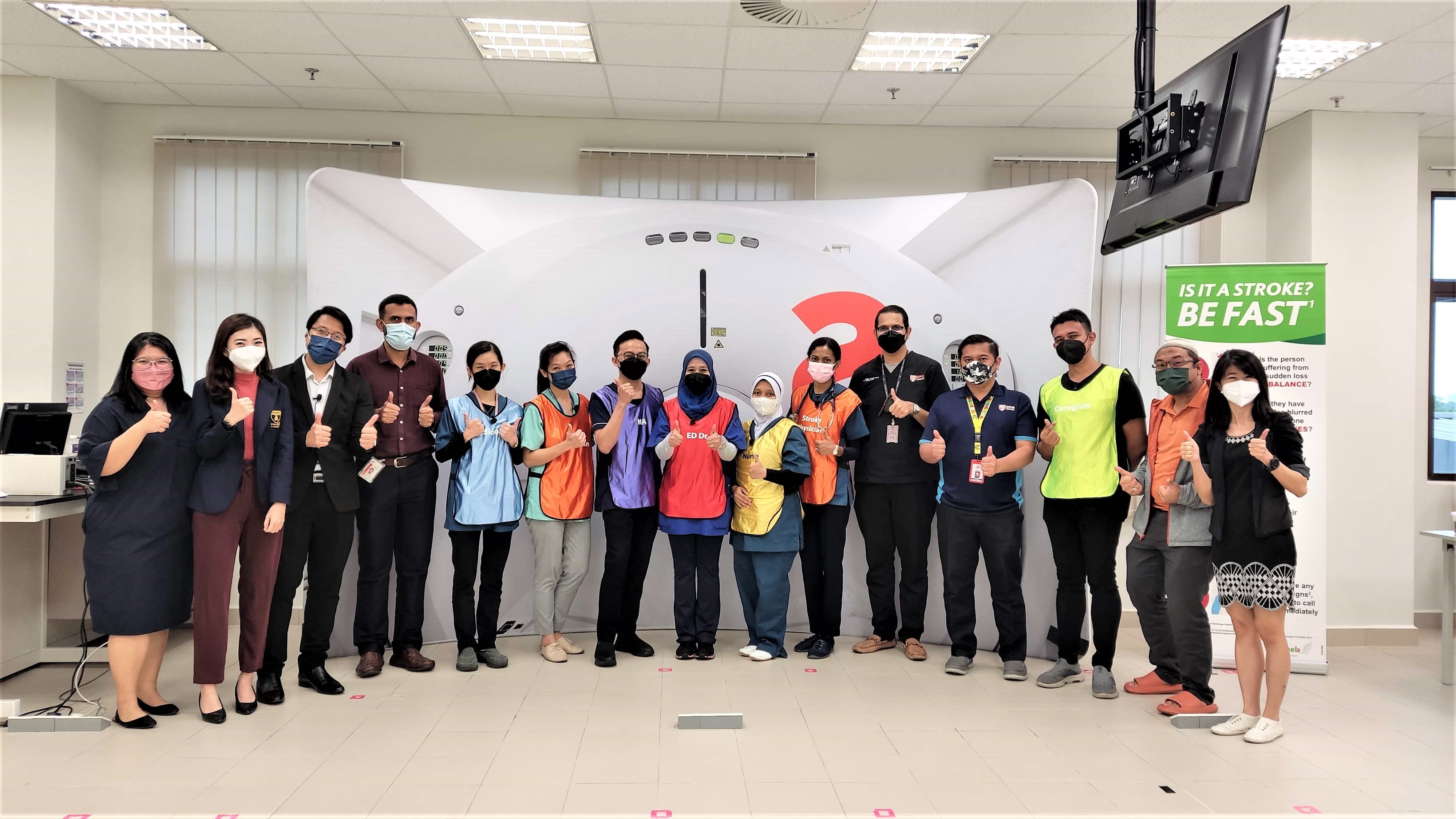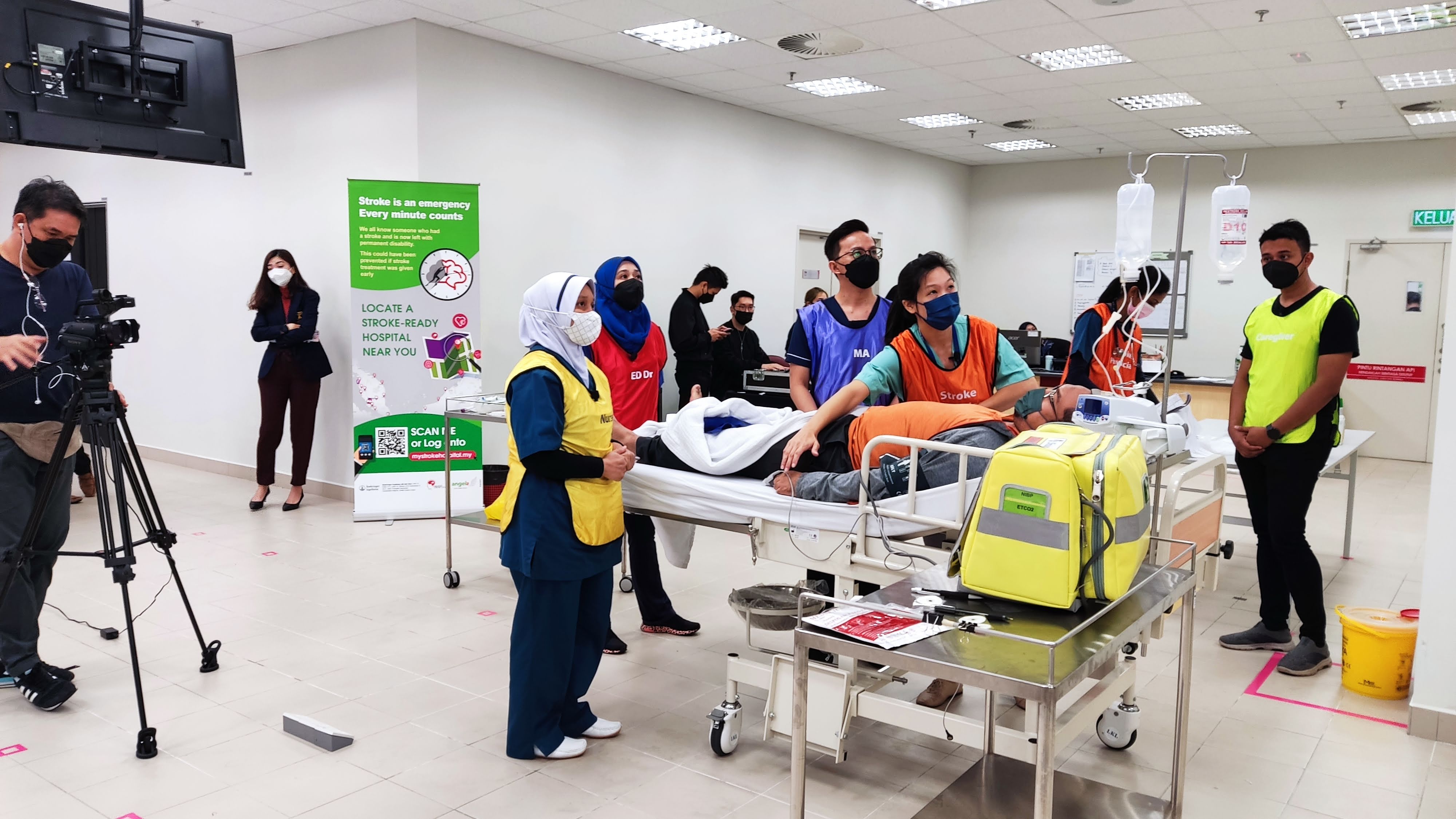
운동선수들은 교육 중에 기록을 거의 설정하지 않습니다. 이는 인간이 우리의 능력 한계를 시험하기 위해 경쟁이 필요하기 때문입니다. 경쟁은 노력을 증가시키고, 성과를 개선하며, 창의성을 자극합니다. 이는 팀원들이 모두 동일한 목표를 향해 일하고 있음을 상기시키고 함께 성공하도록 동기를 부여합니다.
말레이시아의 Angels 팀은 스포츠 팀만큼 뇌졸중 팀도 마찬가지라고 말합니다. 2022년 3월, 이들은 시뮬레이션 팀 챌린지에서 이겨내기 위해 세 곳의 병원을 초대했습니다. 이 챌린지는 말레이시아에서 뇌졸중 치료를 개선하기 위한 싸움에서 처음으로 우호적인 경쟁의 이점을 활용할 것입니다.
목표는 Angels 컨설턴트와 해당 국가의 뇌졸중 치료 프로그램 관리자인 Elva Phan이 병원 내 경로의 격차를 파악하고 팀이 서로에게서 배울 수 있는 시나리오를 만드는 것이라고 말합니다. 이들은 경쟁이 더 높은 수준의 성과로 이어지고, 팀 내에서 관계를 강화하고, 팀 정신을 자극할 것으로 기대했습니다.
첫 시뮬레이션 팀 챌린지는 쿠알라룸푸르에서 남쪽으로 약 30분 떨어진 세르당에 있는 Hospital Pengajar UPM(HPUPM)의 시뮬레이션 센터에서 열린 동료들 간의 3방향 컨테스트였습니다. 2020년 말레이시아 최초의 대규모 뇌졸중 센터가 되어 전담 뇌졸중 응급실을 갖춘 HPUPM을 개최했으며, 2021년에는 최초의 WSO Angels 다이아몬드상을 수상했습니다. 다이아몬드상을 2회 수상한 Hospital Tuanka Ja’afar는 뇌졸중팀 팬데믹 과도기에서 25분의 세계적 수준의 중간 DTN 시간을 기록했고, 해안 도시인 Kuala Terengganu의 Hospital Sultanah Zahirah를 기록했습니다.

3월 4일 금요일 오전 8시 30분에 팀이 진행자인 Abdul Hanif Khan 박사의 브리핑을 받고, 2022년 뛰어난 정신 수상자인 Wan Asyraf Wan Zaidi 박사의 수석 심사위원이 Hospital Canselor Tuanku Muhriz UKM의 신경과 전문의로 팀을 이끌면서 경쟁이 시작되었습니다. 이들은 모두 오른쪽 응시 편위가 있고 이전 2시간 내에 경미한 비방이 관찰된 41세 남성과 관련된 뇌졸중이 의심되는 동일한 증례를 관리해야 했습니다. 그들의 성과는 네 명의 심사위원이 기록하고 평가했으며, 그 결과는 다음 날 Angels 다학제 워크숍에서 발표하고 논의했습니다.
팀은 다음 각 항목에서 25%를 얻을 수 있습니다. 패스웨이 접근법 및 NIHSS 채점, CT 판독, 의사 결정 및 DTN 시간, 팀워크 및 전반적인 우수성에 대해 10%의 보너스가 주어집니다. 판정 기준은 최적의 뇌졸중 경로 관리를 위한 주요 우선순위 조치를 반영했습니다. 예를 들어, DTN 시간을 평가할 때, 출혈이 배제되고 대혈관 폐색이 배제된 후 더 많은 영상을 기다리기로 선택하거나 CT에서 치료를 시작하기보다는 환자를 응급실로 이동시킨 경우 팀이 점수를 잃을 것으로 예상할 수 있습니다.
경쟁팀의 경우, 다음날 오후에는 그다지 빨리 오지 못했습니다. 이것이 바로 다학제 워크숍의 대면 및 온라인 참가자 모두가 시뮬레이션 비디오를 볼 기회를 갖게 된 때이며, Wan Asyraf Wan Zaidi 박사의 의견에 따라 Abdul Hanif Khan 박사는 그 결과를 발표할 것입니다.
Tuanku Ja’afar 병원이 말레이시아 최초의 시뮬레이션 팀 챌린지 수상자로 선정됨에 따라 박수는 HPUPM 강당을 채웠습니다. 그들은 또한 15분 56초로 최고의 DTN 시간을 기록했으며, 17분 11초로 HPUPM을 에징하고, Hospital Sultanah Nur Zahirah는 인상적인 21분 48초로 후면을 불러왔습니다.
그러나 결국, 승리는 각 팀이 경쟁사로부터 배운 교훈보다 중요했으며 병원으로 돌아가게 되었습니다. 워크숍 참가자들도 모범 사례 공유 세션에서 1열 자리를 즐겼습니다.
엘바는 뇌졸중 뇌졸중 센터가 참여하는 DTN 시간 중앙값이 64분에서 56분으로 감소했으며, 다른 클러스터 병원들이 자체 센터에서 경쟁을 복제하는 데 관심을 표명했다고 보고합니다.
Hoo Fan Kee 부교수가 워크숍에서 개업을 한 말레이시아 뇌졸중 위원회는 뇌졸중팀 성과를 개선하기 위한 대규모 팀 도전의 잠재력을 인식했습니다.
모든 참여 병원에서 뇌졸중 치료의 질을 높임으로써, 이는 패자가 없고 환자와 사랑하는 사람이 진정한 승리자인 경쟁입니다.


